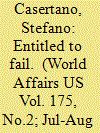| Srl | Item |
| 1 |
ID:
115090


|
|
|
|
|
| Publication |
2012.
|
| Summary/Abstract |
October 15, 2011, was the day when recent Italian history changed course. After twenty years of Berlusconian torpor, Italians staged a large demonstration in Rome to voice their woes. It was not so much the "bunga bunga" sex scandals as the tangible perception of financial distress that drove citizens into the streets. Of course, there had been similar events previously in the Eternal City, most notably a recurring "No Berlusconi Day," but none had had such broad participation. There were families, youngsters, pensioners, blue and white collars, union representatives and entrepreneurs, all chanting and yelling. There were also some who wore black helmets and marched in columns, and some parading with a different uniform of hood and a scarf covering the face. It was just a minority, yet it was motivated enough to turn the half-million-people march into a long afternoon of urban warfare. A Carabinieri (military police) van burst to flames, as paving stones rained on police units. Seventy people had to be treated in the hospital. Television viewers were shocked at the Felliniesque image of a boy carrying a woman in his arms, then throwing her to the ground and kicking her head. It was a statue of the Holy Mary, stolen from a nearby church, and it broke into pieces under his assault.
|
|
|
|
|
|
|
|
|
|
|
|
|
|
|
|
| 2 |
ID:
032468


|
|
|
|
|
| Publication |
London, macmillan Press, 1971.
|
| Description |
142p.Hbk
|
| Standard Number |
333122429
|
|
|
|
|
|
|
|
|
|
|
|
Copies: C:1/I:0,R:0,Q:0
Circulation
| Accession# | Call# | Current Location | Status | Policy | Location |
| 009611 | 945.092/WIS 009611 | Main | On Shelf | General | |
|
|
|
|
| 3 |
ID:
154168


|
|
|
|
|
| Summary/Abstract |
During the 1960s Italy and Greece were undergoing rapid economic and social changes that were significant in both their economic and political ramifications. US policy was able to influence the course of events either bilaterally or multilaterally in the context of the Bretton Woods nexus of institutions and procedures. The central argument of this essay is that Washington's policy was formulated under various contradictory considerations. Cardinal among them was the necessity of preserving the basic requirements of the Bretton Woods regime. The stability of currency parities, particularly the safeguarding of the preeminent position of the dollar as an international reserve currency and its credibility against gold, dictated the continuation of orthodox monetary and fiscal policies. Political stability in Italy and Greece as a prop against political radicalization was a strategic consideration that militated against a strict application of a deflationary policy. The development of transatlantic relations with Charles de Gaulle's France posed a problem from an Allied perspective and was a factor that also militated against the strict application of a policy of monetary stability.
|
|
|
|
|
|
|
|
|
|
|
|
|
|
|
|